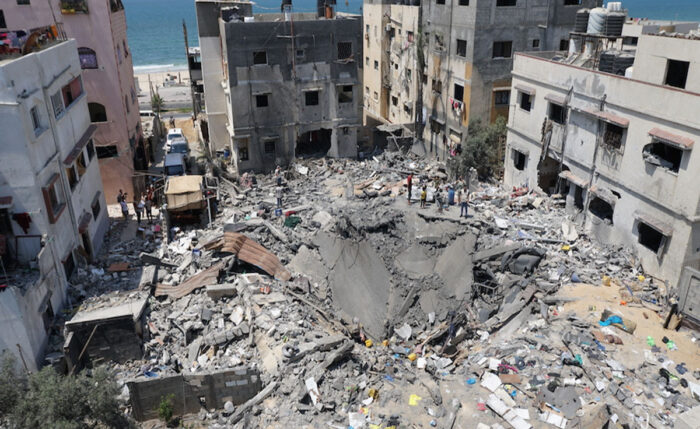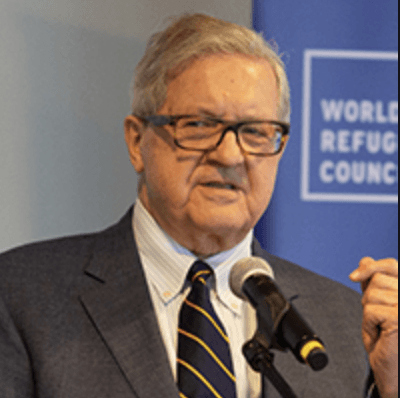Lloyd Axworthy is chair of the World Refugee and Migration Council and a former Canadian foreign affairs minister. Michael W. Manulak is an assistant professor at Carleton University’s Norman Paterson School of International Affairs. Allan Rock is a former Canadian justice minister, attorney-general and Canadian ambassador to the United Nations. This article was originally published in The Globe & Mail.
Israel’s three-phase proposal for Middle East peace, announced on May 31 by U.S. President Joe Biden, is an important step forward and deserves widespread support. The plan, however, leaves important questions unanswered concerning who “governs” Gaza post-hostilities. Notably absent from Mr. Biden’s remarks was any reference to a two-state solution or any guarantee of Israeli security.
Consideration of the “day after” — a subject so far avoided in Israel and the United States – is long overdue.
A prolonged Israeli occupation of Gaza is undesirable and will impose costs on Israel of blood, treasure and reputation. A future role for Hamas, an organization that thrives on violence, is unacceptable. The Palestinian Authority (PA) currently lacks the capacity and legitimacy to govern Gaza.
The solution, then, must come from the international community. But how can this be achieved? A resolution negotiated by a fractured UN Security Council would likely result in the sort of convoluted mandate that has bedevilled other missions – and this assumes that one could even be negotiated.
One option worthy of consideration is a United Nations trusteeship for Palestine. Trusteeships are a product of administrative agreements among UN member states seeking to foster “progressive development towards self-government and independence” of Trust territories based on the “expressed wishes of the people concerned.”
A trusteeship, overseen by a revived UN Trusteeship Council and ultimately the General Assembly, would aim to strengthen Palestinian institutions toward statehood on a fixed time horizon, while working with the consent of the governed. It should be administered by regional actors, such as Saudi Arabia and Jordan, and should focus on rejuvenating the PA. And if the aim is to forge a unified Palestinian state — and it must be — the West Bank should be included in the Trust.
The trusteeship mechanism is a rare example of an international arrangement that has unambiguously fulfilled its mandate in the past. It has successfully overseen 11 Trust territories, facilitating decolonization in Africa and the Pacific and often resulting in independence within 10 to 15 years. With Palestine, this could happen sooner.
The Trusteeship Council, one of the six original UN organs that include the General Assembly and the Security Council, has been dormant since 1994, when the former Trust territory Palau achieved independence. The Trusteeship Council could be reconvened at the request of the Security Council or General Assembly to provide international oversight and support the state-building process in Palestine.
Importantly, while this mechanism would not be subject to veto at the Security Council, its five permanent members would be represented on the Trusteeship Council and would have a significant role in overseeing state-building and reconstruction. Such a mechanism would take due regard for the legitimate security concerns of Israelis, while dealing with related issues, including Jewish settlements on the West Bank and the future of UNRWA. It would also have the virtue of commanding global support.
Crucially, a UN trusteeship would present a clear path to a two-state solution. It would also enable the long-rumoured regional deal built around Israeli-Saudi diplomatic normalization.
While promising, this plan needs leadership at the General Assembly from a group of countries willing to collaborate in support. One option would be convening an informal group to coordinate on diplomatic tactics and spearhead an administrative agreement for the trusteeship. Key regional actors, especially Saudi Arabia, should be at the core of this initiative.
Canada, too, can and should play a leadership role here. It has a reputation as a friend of Israel, yet has pursued a more balanced posture at the General Assembly in recent months. Canada could be a central player in bringing together a network of relevant governments, civil society actors and international institutions to explore the option and work together in support of a trusteeship. The General Assembly has been highly active on Gaza, and such an initiative would likely find a receptive audience there. And the increasing international pressure to find a solution might also overcome the Netanyahu government’s anticipated opposition to a trusteeship plan, especially if the United States supports it.
It is time for an end to this conflict, and for a clear pathway to a two-state solution. A UN trusteeship offers a proven mechanism, and the world’s best chance at achieving both goals.


